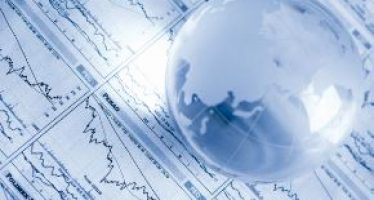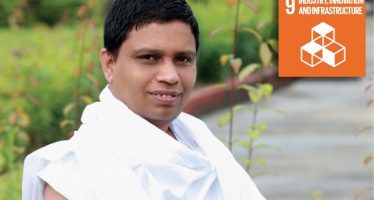Shift to Solar Power Raises Incomes for Salt-mining Families in India
- Example of sustainable energy future moves delegates at UN Forum.
- Sustainable Energy for All leaders outline financing plan to achieve goals by 2030.
- “We are on our way to realize ambitious energy agenda,” says World Bank President Jim Yong Kim
 Every year, whole families in the rural Kutch region of the Indian state of Gujarat await the end of the rainy season, when they make their trek to the salt-rich Thar desert. Tens of thousands of men, women and children migrate there for eight months a year during which they dig wells that fill with groundwater brackish enough to produce tons of salt. They pump the water into flat pans spread out in the hot sun, where it evaporates, leaving behind heaps of salt crystals. It’s a livelihood of hard labor and low returns.
Every year, whole families in the rural Kutch region of the Indian state of Gujarat await the end of the rainy season, when they make their trek to the salt-rich Thar desert. Tens of thousands of men, women and children migrate there for eight months a year during which they dig wells that fill with groundwater brackish enough to produce tons of salt. They pump the water into flat pans spread out in the hot sun, where it evaporates, leaving behind heaps of salt crystals. It’s a livelihood of hard labor and low returns.
But for Divuben Rathod and her family, their labor was eased and their income increased after they borrowed $2,600 from India’s Self-Employed Women’s Association Bank in 2012 to buy a solar water pump.
Shifting to a solar-powered pump was a leap of faith for them, as the diesel pump it replaced costs only $340. But the gamble paid off, as the solar pump uses no fuel. They use the diesel pump only after dusk, now, thereby reducing their fuel costs by 70%. Meantime, their salt production rose by 40%, from 500 to 700 tons over the eight months.
“Never in our lives have we earned so much,” said Ms. Rathod, who invested some of her earnings in a flight ticket to New York City, where she told her story to a roomful of diplomats, financiers and development bank officials gathered at a Sustainable Energy for All (SE4ALL) Forum, co-sponsored by the World Bank Group and the United Nations. “I used the money I saved to bring the voice of 30,000 of the poorest women of Gujarat here to the policy makers of New York,” she said.
“The World Bank Group is firmly committed to working with you in this action phase of SE4ALL. We are taking action to help countries create incentives for energy investment, taking action on financing instruments, such as green bonds, on tapping new sources of capital, and on preparing energy projects that are bankable. It is an ambitious agenda, but we are on our way.”
– Jim Yong Kim, President, World Bank Group
Chad Holliday, Chairman of Bank of America Merrill Lynch and also Chairman of SE4ALL’s executive committee was moderating the session at which Ms. Rathod spoke. He said hers was “the most moving speech I have heard at this forum.” Her example shows that investments in renewable energy can pay, he said, not just by reducing greenhouse gases, but also by creating economic opportunities that transform people’s lives.
Ms. Rathod’s intervention came during a three-day gathering of over 20 energy ministers, who joined over 30 members of the SE4ALL Advisory Board and nearly a thousand delegates, including energy company executives, entrepreneurs, leaders of civil society organizations and officials from governments and international agencies. The meeting’s focus was to consider recommendations for action from working groups that focused on each of the three SE4ALL goals to be achieved by 2030, respectively:
- Achieve universal access to electricity and modern cooking and heating solutions
- Double the rate of improvement in energy efficiency
- Double the share of renewable energy in the global energy mix
A fourth working group concentrated on strategies to mobilize an estimated $755 billion a year in new energy financing to achieve the three goals—the amount identified by the SE4ALL Global Tracking Framework launched last year.
Its chairman, Luciano Coutinho, President of BNDES, Brazil’s national development bank, reported the working group’s conclusion that to deliver energy solutions for low-income countries —and communities like Ms. Rathod’s—subsidies, grants and concessional financing will be required. SE4ALL Advisory Board member Reema Nanavaty, who also heads the Self-Employed Women’s Association that provided the loan to Ms. Rathod, said access to credit is essential to help women in poor communities get access to energy for their families and their businesses.
Expanding access to modern energy services, that is providing electricity to the world’s 1.2 billion people without it and the 2.8 billion who still use wood and other biomass to cook and heat their homes, is the goal with the lowest price tag, $45 billion a year, according to SE4ALL’s Global Tracking Report. The same study found that $390 billion will be needed to achieve the energy efficiency goal, and up to $320 billion to finance new investment in renewable energy to double its share of the global energy mix from the current 18% to 36%.
For all three goals, Coutinho reported, the SE4ALL working group on finance recommends that the World Bank Group and other international financial institutions:
- support early-stage project preparation
- develop and deliver financial instruments that reduce risk
- provide policy and regulatory tools to make renewable energy more competitive with fossil fuel sources, and to boost investment in energy efficiency
“The World Bank Group is firmly committed to working with you in this action phase of SE4ALL,” said Jim Yong Kim, the Bank Group President, in a video message to delegates. “We are taking action to help countries create incentives for energy investment, taking action on financing instruments, such as green bonds, on tapping new sources of capital, and on preparing energy projects that are bankable. It is an ambitious agenda, but we are on our way.”
Copyright © World Bank
You may have an interest in also reading…
Nataly Marchbank: BEPS and Transfer Pricing in South Africa
Recently there has been a steep increase in interest in the taxability of Multinational Companies (MNCs). What effective tax rates
Tadau’s Susanna Lim: CEO’s Vision of a Zero-emissions Future, with the Means and Drive to Achieve It
Malaysia’s Tadau Energy envisions a World without pollution, zero emissions, so that future generations can inherit a healthier planet and
Acharya Balkrishna: Billionaire Monk Makes Modesty and Empathy Watchwords for Progress
Acharya Balkrishna projects an aura of modesty, often clad in a traditional India dhoti, the simple garment of the people

















































































